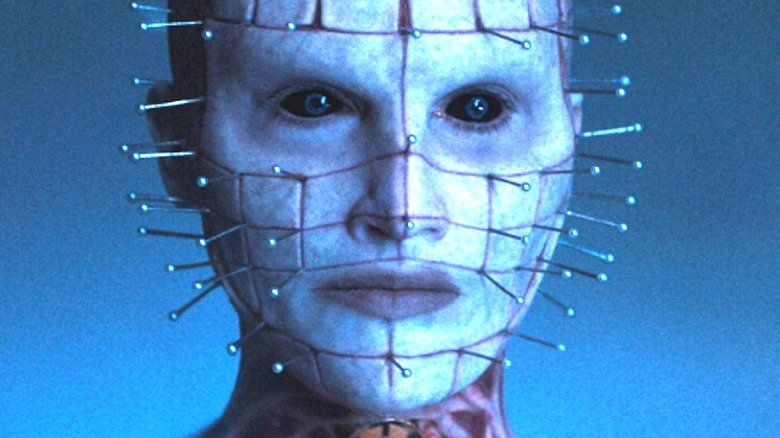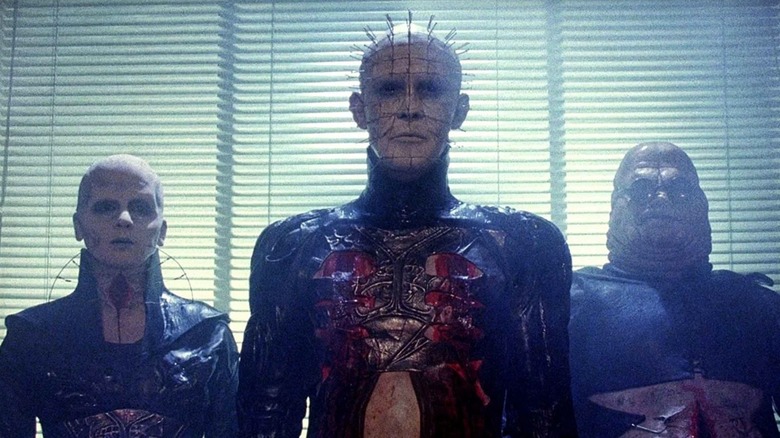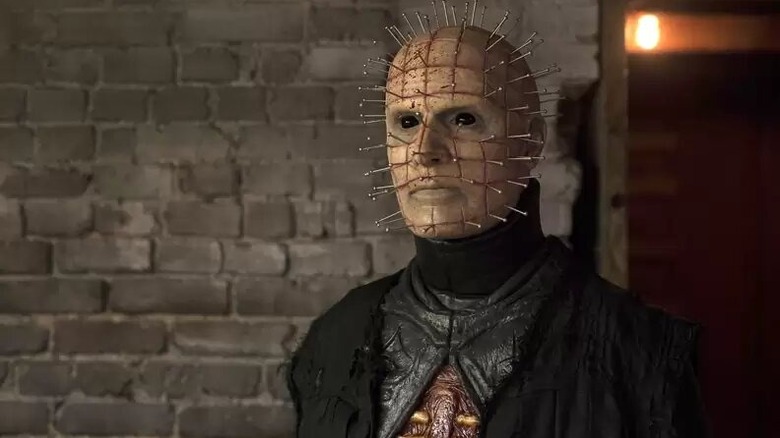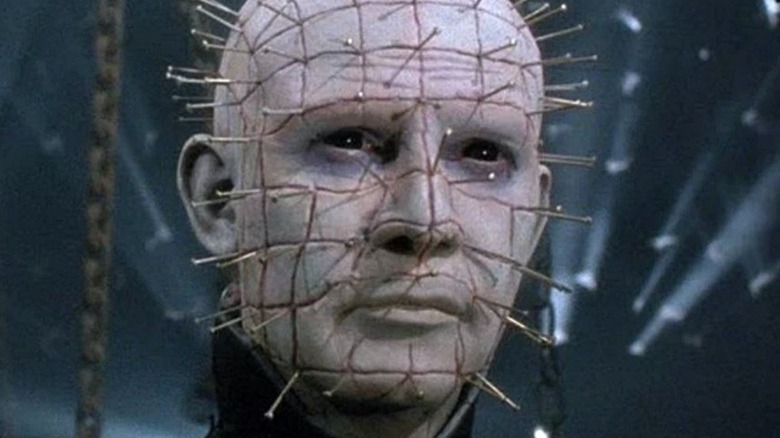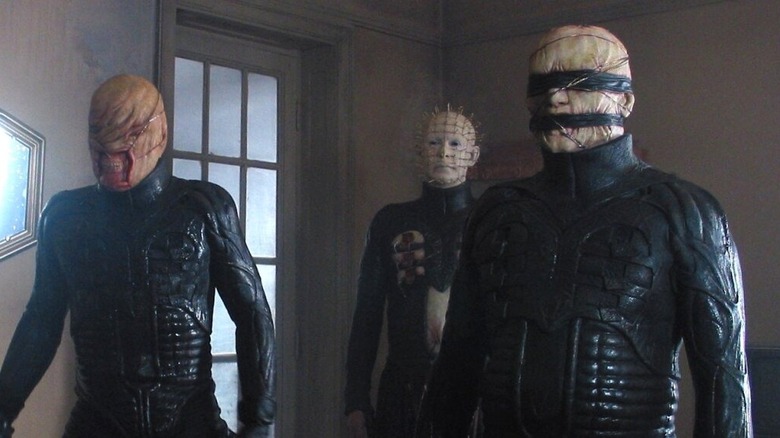Hellraiser Is The Perfect Example Of A Franchise That Will Actually Benefit From A Reboot
"Hellraiser" is the latest horror classic to receive the reboot treatment. Pinhead and the Cenobites are returning to wreak havoc on those who open the Lament Configuration in pursuit of (dis)pleasures of the flesh, and the film will be available to stream on Hulu this October. The early teasers of the horror that awaits look very promising — in fact, fans can expect the new Pinhead to live rent-free in their nightmares.
Jamie Clayton has been tasked with bringing the next iteration of the aforementioned Hell Priest to life. However, while the actress has big shoes to fill, she's already received original star Doug Bradley's seal of approval. Of course, the appeal of a new "Hellraiser" movie extends beyond getting to see talented performers reimagine iconic characters — this is an opportunity to expand upon one of the most fascinating mythologies in pop culture.
While many movie fans will undoubtedly balk at the idea of another horror reboot, the "Hellraiser" franchise is one intellectual property that could benefit from a do-over. The original franchise failed to live up to its potential, and David Bruckner's upcoming film can begin the process to rectify past mistakes. With that in mind, let's discuss where this franchise went wrong and ponder what's in store moving forward.
Summoning the Cenobites
The first "Hellraiser" movie had such sights to show us when it was released in 1987. Clive Barker's directorial debut, adapted from his novella "The Hellbound Heart," introduced viewers to a unique world of demons, mysticism, eroticism, and good suffering. Released during the golden age of slasher films, "Hellraiser" stood out as an original horror offering due to its sophisticated storytelling and themes. Barker's classic was more inspired by fairytales than traditional horror, albeit not the kind you'd show your children. Not that the movie skimped on the gore either, mind you.
The film also established Pinhead (Doug Bradley) and the Cenobites as instant horror icons, and its financial success meant that sequels were inevitable. The follow-up, "Hellbound: Hellraiser II," expanded the mythology and dragged viewers into the Cenobites' Labyrinth for a twisted tale of terror that depicted an original vision of Hell. If anything, the sequel teased a franchise with infinite — and horrifying — possibilities.
Unfortunately, the franchise would soon go in a different direction. "Hellraiser III: Hell on Earth" chose to eschew the sophistication of the first two films in favor of sending the Cenobites clubbing in the city. Then, the Alan Smithee-credited "Hellraiser: Bloodline" took it one step further by sending the demons into space. Still, while the aforementioned movies vary in quality, they were guided by a somewhat cohesive franchise vision, presumably as a result of Clive Barker remaining on board as a producer for the first three sequels. But it wasn't to last...
A waste of good suffering
Every "Hellraiser" sequel after the fourth installment was a direct-to-video free-for-all that bore almost zero connection to the previous films. "Hellraiser: Inferno" was at least commissioned as a "Hellraiser" movie by Dimension Films, but director Scott Derrickson felt that the franchise needed a reset, claiming that "[Inferno] represents a moral framework" that the previous sequels lacked (via ScreenRant).
After that, the gloves were off. Subsequent sequels, such as "Hellraiser: Deader" and "Hellraiser: Hellworld," started life as unrelated movies before writers were hired to shoehorn basic "Hellraiser" lore into the stories for the sake of churning out cheap sequels in order to retain the rights, as noted by Bloody-Disgusting. "Hellraiser: Hellseeker" brought back franchise favorite Kirsty Cotton (Ashley Laurence) and Clive Barker served as a cursory consultant (per CliveBarker.com), but the film was a far cry from the quality of the pair's previous collaborations together.
After Doug Bradley left the "Hellraiser" franchise, new actors portrayed Pinhead in "Hellraiser: Revelations" and "Hellraiser: Judgment." Without going into too much detail, let's just say that these are the lowest-ranked "Hellraiser" movies for a reason.
Why the Hellraiser reboot is necessary
It's not uncommon for horror franchises to go off the rails after a few entries. Most fans of scare fare will agree that Jason Voorhees, Michael Myers, Leatherface, and many of their nightmare-inducing peers became more cartoonish as their respective hack-and-slash adventures progressed. "Hellraiser" endured a similar fall from grace, but it is one horror franchise that always had the potential to warrant multiple sequels.
As previously mentioned, the first two "Hellraiser" movies teased a world of infinite possibilities and felt as if they were just scratching the surface. Even "Hellraiser: Bloodline," which didn't light the world on fire, scores points for its ambition and re-affirming the idea that the Cenobites are immortal beings who've lived through the ages and can be summoned through all time and space. Sadly, no filmmaker had the opportunity to make the most of this concept afterward, unless we count the Cenobites invading the virtual realm in "Hellworld."
Fortunately, the reboot is the perfect opportunity to relaunch the franchise and delve deeper into the lore. If the creators truly want to make the most of this IP, they can capitalize on its potential and tell a diverse range of interesting stories that vary in scope and storytelling capabilities. The good news, though, is that there is plenty of interesting source material out there for filmmakers to mine from.
Where could the Hellraiser franchise go from here?
Following the release of "Hellbound: Hellraiser II," Marvel started producing "Hellraiser" anthology stories through its Epic Comics imprint, which in turn opened the box for the franchise to stray into other mediums. Since then, "Hellraiser" tales can be found in audio dramas, short stories, and novels. Furthermore, this expansion has enabled a host of talented creators — from Neil Gaiman to the Wachowskis — to bring their own twisted ideas to the table.
These sensibilities can easily be applied to film and television. Unlike the aforementioned standalone direct-to-video movie sequels, "Hellraiser" spin-off stories were envisioned as "Hellraiser" projects. However, they're completely varied in terms of storytelling and creative vision. For example, as Dread Central notes, there are stories that take place in France during the Crusades, while others chronicle the origin stories of the Cenobites. Heck, "Hellraiser" even lends itself to crossover stories, as evidenced by Paul Kane's excellent novel "Sherlock Holmes and the Servants of Hell."
If the "Hellraiser" franchise brings this mindset to future movies and television series, then it truly could have such sights to show us. But at least David Gordon Green understands this, as he's promised that HBO's "Hellraiser" TV series will be a "fun cultural experiment" that will be different from the upcoming film (via Entertainment Weekly).
